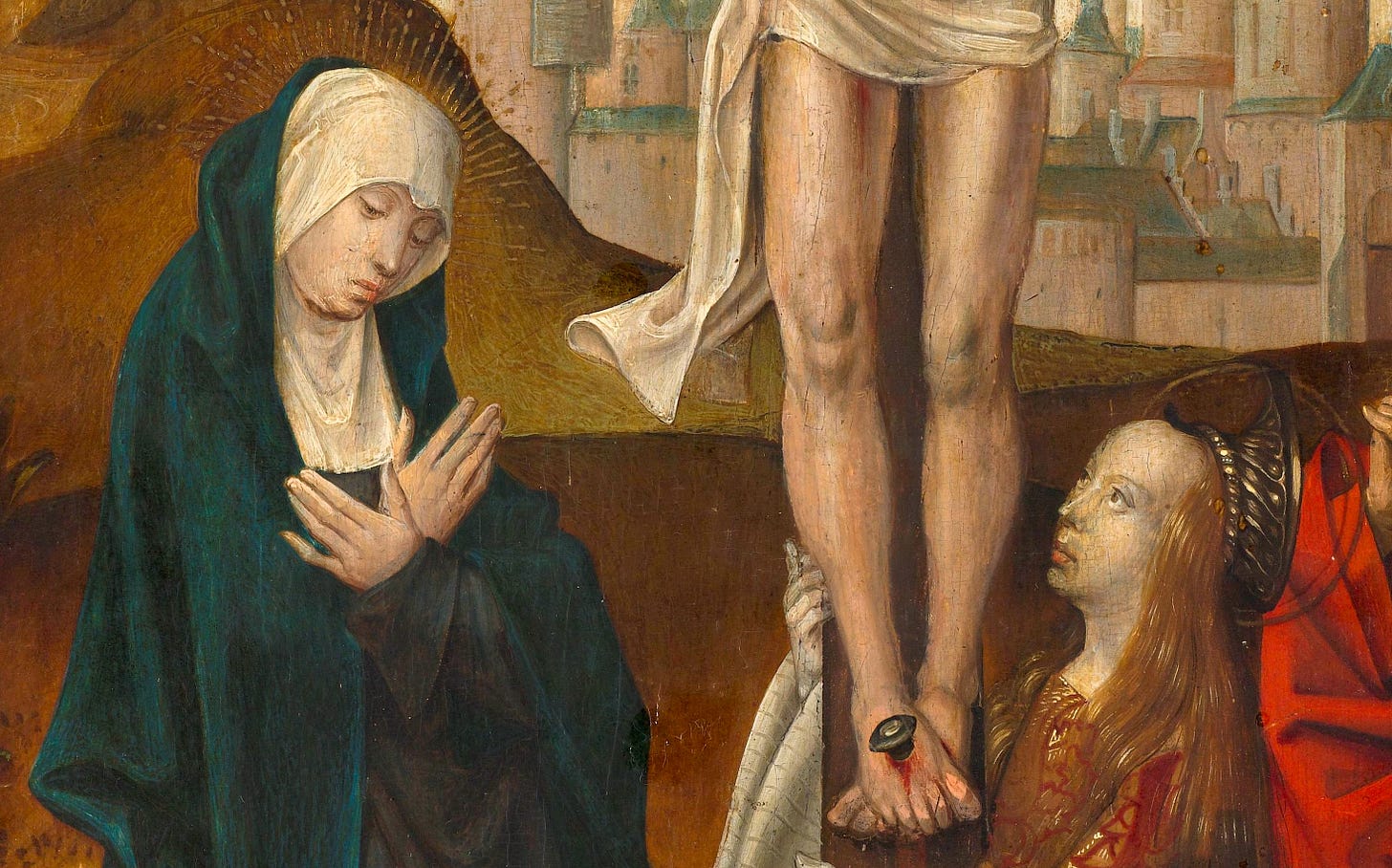Why did the Church recall St Mary Magdalene at the Assumption?
Magdalene's habit revealed at Bethany mirrors a hidden perfection of the Blessed Virgin Mary – and the Church united them on the Feast of the Assumption.

Magdalene's habit revealed at Bethany mirrors a hidden perfection of the Blessed Virgin Mary – and the Church united them on the Feast of the Assumption.
Editor’s Notes
In this third part of the mini-series on the Gospel traditionally read on the Assumption – that of the different “choices” of Ss Martha and Mary – Fr Coleridge tells us:
Why the Church joins Magdalene’s praise to the feast of the Assumption
How Magdalene’s habitual choice of “the best” reflects Our Lady’s hidden life
That her fidelity in small things is crowned alongside that of the Queen of Heaven.
For more on the context of this Gospel passage, and its relation to the Feast of the Assumption, see the Editor’s Notes to Part I.
And for more on whether Mary of Bethany should be identified with Mary Magdalene or not, see below:
The Choice of Magdalene
The Preaching of the Cross, Part I, Chapter XIX
St. Luke x. 38-42
Story of the Gospels, § 101
Burns and Oates, London, 1886
What St Martha’s bustling zeal teaches about spiritual priorities
Why does the Church recall St Mary Magdalene at the Assumption?
The two lives
Our Lord’s words concerning this blessed soul are thus seen to contain a double commendation, and to set her before us as an example, in a twofold light, of what was highly pleasing to Him.
For we must distinguish between the habit of soul of choosing the best which is disclosed to us, and the particular choice made on this occasion by Mary in the exercise of this habit of choosing. It is the particular choice made by Mary which is dwelt on especially by that large class of writers, who, following some of the most famous Fathers, consider this anecdote to be a kind of parable in which is set forth the relative excellence of the life of contemplation on the one hand, and the life of active service and good works on the other.
Mary sitting at the feet of our Lord, and drinking in His gracious words, leaving meanwhile the active service of the preparation of the external banquet to her sister, is the type of the contemplative soul, giving its whole attention to prayer, the exercise of interior virtues, and communion with God.
Martha labouring with all her energy in the external service of our Lord, represents the soul devoted to external good works, of mercy, piety, religion, charity, the field for which is of limitless extent under our present condition, and for the sake of these, contenting itself with shorter prayers, less frequent presence before the altar, seeing our Lord in all the various objects on which, for His sake, its labours are so freely lavished, leaving Him, as it were, in the Tabernacle in order to find Him in the poor, the sick, the ignorant, the afflicted, whom He has put in His own place, with the promise that He will consider what is done for them is done to Himself.
Both dear to our Lord
Both these two sisters are very dear to our Lord, and both the lives which they represent give Him great delight and great glory.
These two lives are sometimes entirely distinct, sometimes they are to a certain extent combined.
The active life is nowhere safe without the interior spirit and a certain amount of religious retirement and peace, to preserve it from degenerating into empty external activity. The contemplative life cannot be without an immense fire of charity kindled in the soul by communion with our Lord, which lights up the zeal of the heart into a great flame of prayer and longing for the glory of God and the salvation and perfection of souls.
Thus the hearts of many of the contemplative souls have been as great instruments in the promotion of God’s glory by the advancement of the Church, the conversion of sinners, the spread of the knowledge of the faith among heathen nations, and the like, as the famous missionary saints themselves.
The work of the Church is kept up by the prayers and merits and sufferings and labours of the votaries of each of these lives in their respective spheres, and our Lord alone knows what His Kingdom on earth owes to each.
As Martha stepped beyond the perfect path when she, to some extent, found fault with Mary, or with our Lord’s indulgence towards Mary, so the children of the active life must not complain of the idleness of the contemplatives, nor must the contemplatives look down on the industry and toil of those who have that other vocation.
It is our Lord’s will to be served by both, and He does not call His active workers away from their activity, except occasionally, as He called His Apostles to ‘come apart into a desert place and rest awhile,’ nor does He, except on certain great emergencies — as when the monks of the desert left their caves and cells to contend for the orthodox faith in the Arian times — send His contemplatives forth from their hallowed rest to mingle with the noise and dust and turmoil of the world.
He distributes, as He wills, His gifts and His vocations, He does not give to all the same work, nor does He permit any interference of human prudence or worldly judgment, to mar the beautiful harmony and regulated variety of His whole system, which is as many-coloured and as multifarious in its splendours as the earth with its flowers and its fruits. Each is beautiful in its degree and kind, and the beauty of the whole is the issue of the combination and contrast of the parts.
Double lesson from Mary
The other great lesson which is here taught us by the example of Mary and by our Lord’s words concerning that example, is that simple rule of Christian reason and prudence, in accordance with which the thoughtful soul is continually exercising its privilege and gift of choosing what is best.
When this rule is simply stated, it seems as if no one could be thought to act reasonably, and in a manner becoming the dignity of a being endowed with freewill, who left any part of his conduct to chance, and much less, who allowed his choice to be guided by passion, or prejudice, or the low motives of worldly interest. And yet when we turn to the lives of the saints, we find that it is considered the most arduous height to which they can attain, when they have become so familiar with the use of choice directed always to what is the best as to be allowed without imprudence to make this practice the subject-matter of a special vow.
Our Lord’s words give an insight into the souls both of Martha and of Mary. Martha, disturbed and troubled by a multiplicity of calls and cares, is by the very fact of her disturbance unable to guide her choice between what is natural, or good, or better, or best, and so she gives way to the imperfection of at least an ungracious and undiscerning complaint. Mary has from the first guided her choice with her habitual delicacy and precision of judgment, and so she earns from our Lord the most consoling defence and protection, as well as the further assurance that what she has chosen shall not be taken from her.
And it may be considered as a special beauty about the incident in which this great lesson is conveyed to us, that the choice of Mary does not relate to the disposal of her whole life, as is the case, for instance, when what is called a vocation has to be ascertained, but simply to the employment of a certain short space of time, while the preparations were being made for the entertainment of guests who had taken her sister and herself by surprise.
Always choosing the best
These words characterize the whole life of this most glorious Saint, for we shall find them apply to her in what is yet to be told of her, as well as to what was past at the time of which we speak. We shall see her choices in the Supper at Bethany, in her place by the Cross, in her conduct at the Entombment, at, and after the Resurrection.
All through she is set before us as an example of the habit of choosing the best in the daily incidents and surprises of life, rather than in matters of greater moment. For there will always be many who will settle these greater matters according to the rules of Christian and spiritual prudence, and who will yet not understand how exceedingly precious in the sight of our Lord is the habit of choosing on the same principle with regard even to occasions that seem the most trivial.
In every such choice there is a whole array of spiritual beauties, a whole treasury of lofty merits, the intelligence of which is one of the great foundations of the interior life.
The words applied to our Blessed Lady
It was in a continual chain of choices of this kind that the life of the Blessed Mother of God herself was spent.
She did no actions that were splendid in themselves in the eyes of men, and yet her least and most ordinary actions were more perfect in the eyes of God than the adorations of the highest Seraphim.
Her namesake and companion was, in the incident now before us, acting on the same principle and in the same manner which made the actions of that Blessed Mother herself so supremely pleasing to God.
And the Church seems to acknowledge this truth, for she reads this Gospel on the crowning feast of all those which she keeps in honour of the Blessed Mother. She puts into the mouths of her priests and children again and again, as the praise which belongs to her whom they rejoice to follow to her throne itself in Heaven on the day of her glorious Assumption, these words first spoken of her namesake at Bethany:
‘Mary hath chosen the best part, which shall not be taken away from her for evermore.’
Subscribe now to never miss an article:
The Choice of Magdalene
What St Martha’s bustling zeal teaches about spiritual priorities
Why does the Church recall St Mary Magdalene at the Assumption?
Here’s why you should subscribe to The Father Coleridge Reader and share with others:
Fr Coleridge provides solid explanations of the entirety of the Gospel
His work is full of doctrine and piety, and is highly credible
He gives a clear trajectory of the life of Christ, its drama and all its stages—increasing our appreciation and admiration for the God-Man.
If more Catholics knew about works like Coleridge’s, then other works based on sentimentality and dubious private revelations would be much less attractive.
But sourcing and curating the texts, cleaning up scans, and editing them for online reading is a labour of love, and takes a lot of time.
Will you lend us a hand and hit subscribe?
Follow our projects on Twitter, YouTube and Telegram:




